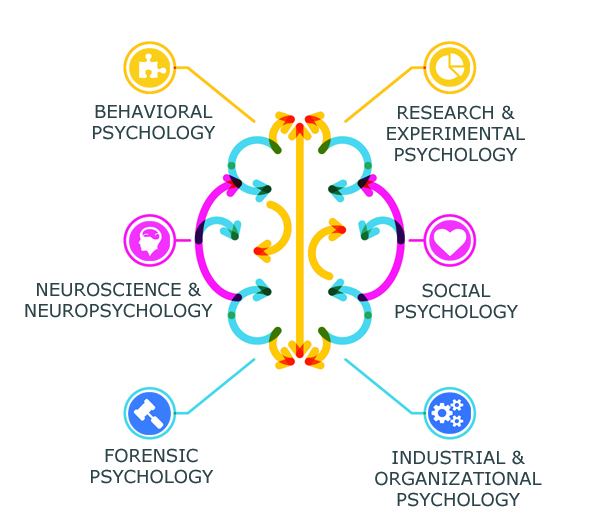Psychology Majors & Careers:
What Can I Do With a Degree in Psychology?
A Comprehensive Guide for Students
The human experience is a multifaceted one. No single study can ever fathom the incredible depths of human behavior, thoughts, and emotions.
Because there is so much to the human mind, psychology is broken up into a great number of specialties. This enables psychologists and psychology students alike to streamline their study and career according to the different branches of psychology.
Some fields, such as Child and Developmental Psychology, allow us to understand a person’s life-long psychological growth, whereas Forensic Psychology offers a peek into the workings of the criminal mind. There are many paths to pursue for those interested in psychology, which also means there are many careers options available as well.

Sponsored School(s)
First Steps
In Pursuing Your Psychology Career
To begin your psychology career you’ll need to obtain a degree in psychology from an accredited school. You can search our database by state, degree or specialty (or all three) to find the best program to fit your needs.
Not sure which area to focus in?
Learn more about the most popular fields in Psychology below.

The Ultimate List of the
Most Popular Careers in Psychology
If you’re looking to earn a degree in psychology, but are not sure what specific branch to specialize in, it would be helpful to know what each branch deals with. That way, you can base your decisions on what aspect of psychology intrigues you most. Below is a list of the different types of degrees you might pursue in your psychology studies followed by an overview of some of the more popular fields of study, or you can browse through our complete list of psychology specialties.

Child & Developmental Psychology
People go through a lot of changes in the span of a lifetime. From infancy to old age, a life is marked with certain crucial developmental stages. It is in Developmental Psychology’s interests to examine these life stages under a scientific eye.
Developmental psychologists study what goes on in an individual’s mind during different periods in life. For example, a newborn infant may be categorized as a bundle of reflexes. As that child ages, however, his mental processes become more and more sophisticated, and soon he learns to think, walk, talk, and reason.
The child then goes through several key stages that help define his very personality. This sort of psychological transformation goes on throughout the child’s life, well into old age.
Through Developmental Psychology, you will learn exactly how that development takes place, and how to nurture it. Although most people may put a lot of weight onto childhood development, this branch of psychology is just as concerned with adolescence, adulthood, and old age. As such, those who take up Developmental Psychology don’t necessarily have to limit their career options to child psychiatrists and the like.
The training will also make them excellent social workers, life coaches, and nurses for the elderly. If you’re the type who is fascinated with the psychological growth of an individual, then Developmental Psychology is perfect for you.
Learn more about Child and Developmental Psychology.

Counseling Psychology
Perhaps the most widely-known application of psychological principles is that of counseling. Therapists, social workers, and guidance counselors are just a few of the professionals who receive training in counseling psychology. Marriage counselors, criminal rehabilitators, and other such problem solvers may also require basic training in counseling.
As the human psyche is an incredibly delicate and varied thing, it Is necessary that any counseling takes place with great care. After all, counseling is meant to heal any emotional or mental pain, not aggravate it.
By following certain techniques that have been honed over the years, counseling psychologists are able to mend the wounds caused by distress and trauma in the safest, most respectful way possible.
If your primary concern is to help people become happier, healthier, and more well-adjusted to what life brings them, you may want to give Counseling Psychology a shot.
Learn more about Counseling Psychology.

Forensic Psychology
What makes the criminal mind tick? A background in Forensic or Criminal Psychology may provide all the tools you’ll need to find out. By studying the motivations and behavior patterns of criminal offenders, criminal psychologists may be able to predict their next step.
Also discussed in Forensic Psychology are the foundations of rehabilitation, which will hopefully help the law-breakers reform and become productive members of society. If you’d like to become a criminal investigator, or are looking to break into forensic science, this specialization will be of great help.
Learn more about Forensic Psychology.

Social Psychology
While psychology most often studies how and why an individual’s psyche is formed, this branch takes a look at how that psyche interacts with others in the environment. Social Psychology is exactly what it says it is — the psychology of being social.
We all live in a social world, and so it’s only necessary that we study how society affects our psyche, and vice versa. Social Psychology is all about interaction — what makes you act a certain way when you’re with certain people, how your actions may rub off on others, even how certain things or people attract you.
By studying the extensive network of human social interactions, social psychologists hope to understand and improve society as a whole.
Because of this, social psychologists make excellent relationship counselors, social analysts, social workers, and even media executives. If you’re a real people person, and would like to deepen that aspect of yourself, then you’ll be glad to specialize in this most social of social sciences.
Learn more about Social Psychology.

Cognitive & Behavioral Psychology
Cognitive Psychology, in a nutshell, is the study of the mechanisms behind thought and perception. If biopsychology examines how electrical impulses from the nerves and brain create thoughts and actions, cognitive psychology attempts to see how those thoughts tie themselves together.
If, for instance, you see an apple, the biopsychological reaction would be as follows — you see a cluster of information, i.e. “red”, “shiny”, “round”, “small”, and “fruit”. This information then travels from the optic nerves in your eyes and into the brain. The brain will then receive those bits of information, acknowledging what you saw.
The cognitive psychology aspect would then attempt to explain exactly what this red, shiny, round, small, fruit thing is. How do you know it’s red? Or shiny, round, and small, for that matter? And how is it that when you see this red, shiny, round, small, fruit thing, your mind bundles them up together and recognizes an apple? These are the questions that cognitive psychology attempts to explain.
Cognitive psychology teach you why you perceive what you perceive, and why you think what you think. In addition to perception, topics that fall under this science include memory, numerical cognition, information management, and even language.
Problem-solving is another subject covered by cognitive psychology, as it represents a sort of culmination of all the internal processes of the human mind.
With so many abstract concepts that must be empirically examined, cognitive psychology requires a highly-analytical mind with a strong scientific work ethic. If you fit this description and are interested in the inner workings of thought itself, cognitive psychology may prove to be a most fulfilling specialty.
While cognitive psychology deals with the scientific basis behind thoughts, behavioral psychology involves the reasons behind actions. Through careful analysis of the human experience, this branch of psychology aims to unravel the processes behind a person’s behavior.
Why did he do that? What brought about these reasons? These are the questions that behavioral psychology hopes to answer through the scientific method.
Behavioral psychology often begins with a discussion on cause-and-effect reactions to perceived rewards and punishments. This is due to the fact that much of behavioral psychology is built on the foundation of conditioning — the idea that we act the way we do because of the results we expect.
Ever wonder why babies enjoy shaking rattles? Behavioral psychologists would infer that the babies discover by accident that whenever they shake their shiny new toy, an interesting sound comes out of it. They more they shake it, the more sound it makes, and so they learn that this sort of behavior (the shaking of the rattle) will provide desirable results (the sound).
Things, however, eventually go much deeper than that. As the human experience becomes more and more complex with age, so too, does the rationale behind a person’s actions. Results become classified as reward or punishment, and even then the definition of the two may be very complex.
As such, behavioral psychologists rely on data from a host of sources, like the subject’s personal history, surroundings, and any other factors that may contribute to his motivations.
The information is then summed up through behavioral analysis. With the results, behavioral psychologists hope to determine the most effective methods of understanding, predicting, and modifying the subject’s behavior.
If you think you have what it takes to observe, record, and ultimately predict what people are going to do, then you’d be a great fit for behavioral psychology.
Learn more about Cognitive and Behavioral Psychology.

Clinical Psychology
Sometimes you just need time alone with your thoughts – and sometimes you need someone else to listen and help you through all of your complicated and confusing feelings. Many people struggle with stress, anxiety, depression, and even harmful behaviors that may provide temporary relief, but often leave them feeling embarrassed and even more alone.
In other cases, traumatic events or life changes may interfere with a person’s ability to lead a healthy and positive life. Clinical psychologists work with clients to provide them with the skills to overcome those issues so that they might have a more healthy and fulfilling life.
Most often done through individual therapy, clinical psychologists guide clients through the dark places that are negatively impacting their life and help them move beyond those roadblocks. Because our ability to create and maintain meaningful relationships is important, clinical psychologists often work with couples to focus on increasing awareness, improving communication, and skill building. In some situations, clinical psychologists may also offer group therapy sessions.
About one-third of clinical psychologists work in health care facilities, and another third operate their own practices. While many clinical psychologists work with clients, the long hours, particular on weekends and evenings are often draining. There are other possible professional avenues with more flexible schedules, including research, teaching, or working with corporate or governmental agencies.
Learn more about Clinical Psychology.

Educational
Psychology
Have you ever met a person who, despite all your best efforts, simply can’t learn something? Educational Psychology hopes to break that sort of thinking. Every person is different, and thus ever person has different needs fulfilled in order to learn.
By researching the different learning patterns of individuals, educational psychologists are able to devise techniques that will maximize a person’s learning capabilities, allowing him to fully realize his potential.
Those looking to work in the field of education would be smart to seek at least some basic training in Educational Psychology.
Learn more about Educational Psychology.

Industrial & Organizational
Psychology
The workplace is one of the most important areas of psychological emergence. Industrial and Organizational Psychology takes a look at the dynamics of the workplace in an effort to improve productivity and boost worker morale. Topics covered in this specialization often include group dynamics, creativity, work relations, team management, work management, and leadership.
Industrial and Organizational Psychology is in high demand in the corporate world. If you want to break into it in an influential manner, this may very well be the ideal course for you. Those who receive training in Industrial and Organizational Psychology often move on to be organizational consultants, human resources professionals, and even managers.
Learn more about Industrial and Organizational Psychology.

Neuroscience & Neuropsychology
Fields within neuroscience and neuropsychology involve the study of the brain, its physiology, and its biochemistry. By taking a look at the structure and physical functions of the brain, neuropsychology experts are able to discern exactly how these processes affect human perception and behavior.
Neuropsychology has a wealth of value in the realm of research. For example, scientists can figure out which areas of the hippocampus are most active when a person becomes angry.
One can also study the effects certain chemicals have on the brain, and in what quantities these chemicals are considered hazardous. Most mood-altering or mood-stabilizing medications are developed based on the principles of neuropsychology or biopsychology.
As the brain acts as the central unit of the human nervous system, neuropsychology’s reach extends throughout the entire body. Every single human experience begins with a stimulus. That stimulus will travel down a body’s neural pathways, ultimately leading to the brain, which will then interpret that information.
Neuropsychology attempts to study this incredibly complex system in an effort to gain a scientific understanding of exactly how a person’s perception and behavior come about.
As can be expected, neuropsychology can provide for a strong medical background. In fact, neuropsychology is often considered as the most medical of all psychology branches, as it relies heavily on anatomy, cell and molecular biology, chemistry, and biochemistry for its research.
If you’re interested in these four sciences, and would like to see how they influence the human experience, neuropsychology or biopsychology may be the specialization for you.
Neuropathology is also considered a subtopic of biopsychology. In this branch of study, scientists focus on the maladies of the nervous system. If, for example, a patient develops seizures, a professional trained in neuropathology may be able to trace the root of the problem and recommend a cure.
Learn more about Neuroscience and Neuropsychology.

Research & Experimental Psychology
As with any science, psychology is rife with research and experimentation. After all, researchers could use all the data they can get. However, since psychology deals with the human mind, a strict code of ethics must be followed at all times.
Experimental Psychology has since emerged as a field to ensure that no person is harmed as a result of experimentation. With detailed discussion on the methods, rationale, and laws governing psychological experimentation, budding researchers are well-equipped with the tools needed to succeed in their future careers.
Learn more about Research and Experimental Psychology.

Health & Sports
Psychology
Health psychologists focus on the complex relationship between our bodies and our emotional health. When someone is diagnosed with an illness or has health issues, such as diabetes, chronic heart disease, or other physical problems, the emotional effects can be devastating for the patient and for those around them.
A health psychologist helps clients cope with complex health maintenance routines that include special diets, multiple medications and supplements, restrictions, and losses. Other issues include boundaries, self-care, nutrition and sleep practices that support your well-being, how to choose the best medical and mental health providers, grief and loss, and related topics.
Because health issues often affect family and friends in various ways, health psychologists may offer resources for them as well. Health psychologists often provide group support meetings for clients and family members in addition to individual counseling.
Some health psychologists will, with the client’s permission, act as an advocate with the client’s health care providers. He or she may collaborate with providers to assure that all of the client’s needs are being heard, respected, and addressed. Health psychologists believe that wellness happens at the physical, emotional, intellectual and spiritual levels and health psychologists will help you work toward balance on all levels.
In a related field, psychologists may also help athletes with their mental health. Athletes are under constant pressure to perform. With practices, their coaches, and the need to juggle their busy schedules with their regular lives, the entire ordeal can be very psychologically taxing.
As a result, many sports professionals have turned to psychologists to help them overcome the hurdles they can’t just simply jump over — the mental ones. The field of Sports Psychology has emerged as a result of that.
By teaching athletes things such as stress management and mental motivation, sports psychologists are able to help them perform markedly better in their chosen events. Fans of both sports and psychology alike will definitely find fulfillment in this specialization.
Learn more about Health and Sports Psychology.

Media
Psychology
This subtopic of Social Psychology is slowly coming into its own, as our media-dominated society has made the subject an incredibly significant study of the human experience. Everywhere we go, we are bombarded by mass media, which in turn has a profound effect on our development and behavior.
How many times have you bought a product simply because of its commercial? How many friends of yours emulate the personalities they see on TV? How many times has a musical artist “changed your life”? By taking up media psychology, you’ll understand exactly why this happens, and how savvy advertisers and media executives can use this to their advantage.
Learn more about Media Psychology.
Looking for More?
One of the most exciting things about pursuing a degree in psychology is the range of possible career choices. From working with young children or seniors, people with disabilities or mental illness to helping athletes achieve their goals or even assisting businesses in creating healthy work environments, the possibilities are almost endless. In all cases your primary goal is to help people, but the way you can do that comes in many forms. Below is our complete list of possible focuses for a student majoring in psychology.

- Animal Behavior
- Applied Behavior Analysis
- Applied Psychology
- Art Therapy
- Behavioral Neuroscience
- Behavioral Science
- Business Psychology
- Career Counseling
- Child Psychology
- Christian Counseling
- Clinical Psychology
- Cognitive Neuroscience
- Cognitive Psychology
- Cognitive Science
- College Counseling
- Community Psychology
- Consumer Psychology
- Counseling Psychology
- Developmental Psychology
- Educational Psychology
- Engineering Psychology
- Experimental Psychology
- Forensic Psychology
- Genetic Counseling
- Geriatric Psychology
- Health Psychology
- Human Development
- Human Factors
- Human Services
- Humanistic Psychology
- Industrial-Organizational Psychology
- Marriage and Family Counseling
- Media Psychology
- Mental Health Administration
- Mental Health Counseling
- Music Psychology
- Neuropsychology
- Neuroscience
- Pastoral Counseling
- Personality Psychology
- Personnel Psychology
- Psychology
- Psychopathology
- Psychopharmacology
- Psychotherapy & Psychoanalysis
- Rehabilitation Counseling
- School Counseling
- School Psychology
- Sex Therapy
- Social Psychology
- Social Work
- Somatic Psychology
- Sports Psychology
- Substance Abuse Counseling
- Trauma Studies
About the Author
Angie Boss is an award-winning health writer and author or co-author of several books, including Before Your Time: Living Well with Premature Menopause (Simon and Schuster, 2010). She received a Bachelor’s of Arts degree in Sociology and Journalism from Virginia Wesleyan College and a Masters of Pastoral Counseling from Union Theological Seminary.






